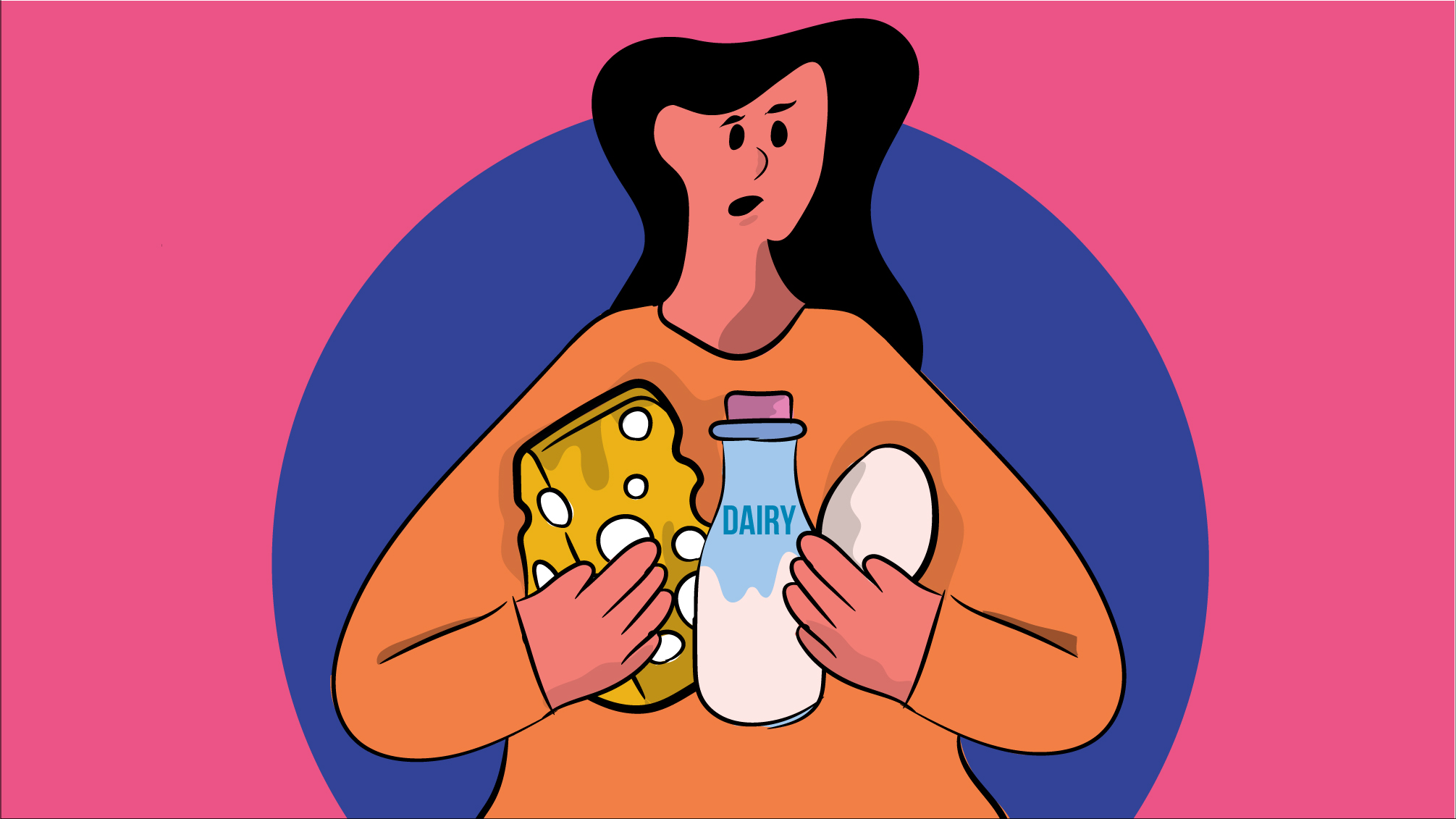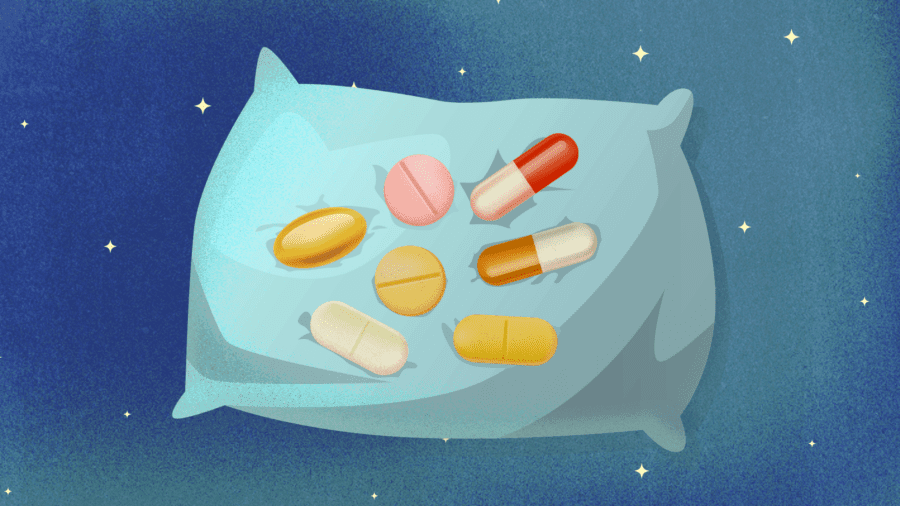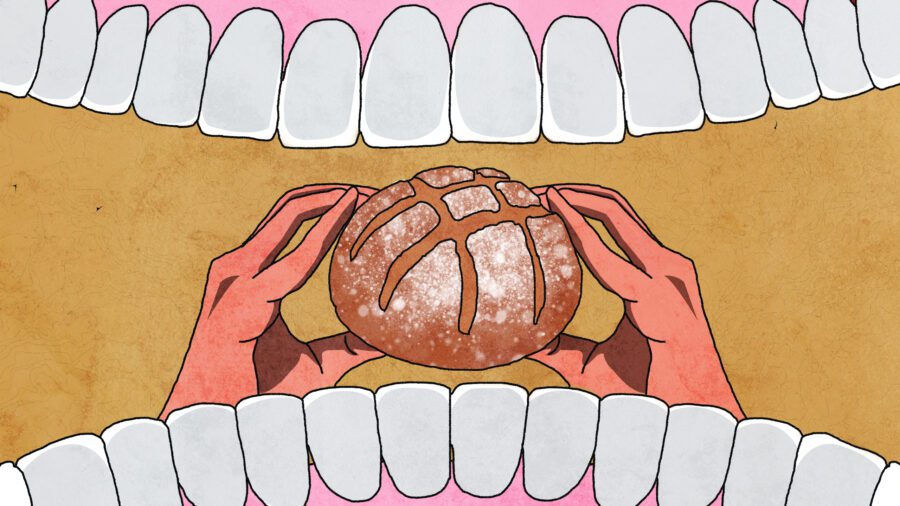
Is Dairy Actually Bad for Your Gut Health? Here’s What Both Sides Have to Say.
If you only take your lattes with oat milk now, you’re far from alone.
Dairy’s gotten a bad rap in recent years, both from conflicting information about its ability to create strong bones (some studies showed it had the opposite effect) and fears about how the hormones found in dairy might lead to scary conditions like prostate cancer.
It’s also a little controversial when it comes to the gut. If you haven’t noticed, the past decade has seen an explosion of research and interest in how digestive processes and the health of our gut, particularly our gut microbiome, impact our physical and mental/emotional well-being.
The gut-brain axis, mediated by the fascinating vagus nerve, which transmits information back and forth from our bellies to our brains, plays a primary role in how we think, feel, behave, and react to life circumstances.
When our gut’s on fire, our brain’s on fire. So, disrupted gut functioning can lead to brain inflammation that manifests as brain fog, depression, and anxiety. Plus, because 95% of our serotonin is produced in the belly, the gut plays a crucial role in neurobiological processes that affect your mood every day.
So, is dairy bad for your gut? If you do eat dairy, how many servings per day is best? If you choose to forgo it, how long does it take to detox from dairy? In this article, you’ll get a well-rounded perspective on this controversial subject so you can determine what’s best for you and make the changes you need.
Ready to learn more about supporting your gut health? Let’s get into it!
The Benefits of Dairy for Gut Health
If you can’t stand the thought of giving up brie on baguette or veggie frittatas just yet, don’t worry. There are a number of great benefits to eating dairy.
Probiotics
You likely know that dairy products like cultured yogurt and kefir are brimming with probiotics that keep your gut microbiome healthy, but perhaps you didn’t know how important it is to do so. Most people’s lifestyles today aren’t conducive to maintaining a healthy gut microbiome, which will impact your overall well-being.
First, there are antibiotics, which by default, wipe out all bacteria in the body, including those that are beneficial. Antibiotics are readily and easily prescribed, and this has serious implications for your mental health. A 2015 study found that antibiotic exposure increases the prevalence of anxiety and depression.
Lower levels of beneficial bacteria in the gut also impact immune function. Studies have shown that gut microbiota has direct and indirect effects on immune responses, including activating natural killer cells. Gut function has also been linked to numerous other conditions, including heart disease.
Antibiotics aren’t the only culprits behind a diminished microbiome. Inflammation is a major player, and can be caused by stress, alcohol, lack of sleep, excessive nervous system stimulation, fried foods, processed sugar, gluten, and additives, like emulsifiers.
For most Americans, incorporating probiotic-rich dairy such as yogurt, kefir, cheese, and sour cream into their diets is typically easy to do. Since dairy also offers other benefits like protein and minerals, incorporating fermented dairy into your diet is one good way to boost the health of your microbiome.
Casein
The protein found in most dairy, casein, is also beneficial for the gut. This underrated protein is a favorite among athletes for its muscle building abilities. According to Healthline, it’s a slower-burning protein that takes more time to break down.
Studies have shown that it’s full of branched chain amino acids (BCAAs). Higher amounts of BCAAs in the gut have been linked to a younger-looking microbiome. That’s great, but keep in mind that scientists have only proven there’s a correlation between these two, not a cause.
However, casein is also associated with higher amounts of another beneficial bacteria, Bifidobacterium bifidum (B. bifidum), which is associated with improved immunity, lower rates of Irritable Bowel Syndrome (IBS), and the potential to treat lung infections, ulcerative colitis, and restoration of good bacteria following chemotherapy treatments.
The Risks of Dairy
The science of how dairy affects our gut microbiome is complicated and often contradictory. For example, while the probiotics found in dairy can support the microbiome, dairy itself can cause inflammation, which diminishes the diversity and health of the microbiome.
Dairy-related inflammation can manifest as acne, bloating, or other gastrointestinal symptoms. This may be especially true for those who are lactose intolerant or who have Crohn’s or Celiac diseases, which may lead to secondary lactose intolerance.
As we’ve covered, when there’s inflammation in the gut, it directly impacts the brain. Yet since the brain doesn’t have pain receptors, you won’t know that it’s happening. Instead, you might feel bloated after a meal followed immediately by brain fog. Some researchers believe all of this leads to depression and anxiety.
On the other hand, there’s some evidence to support dairy’s beneficial to neutral impact on inflammation.
Lastly, research has shown mixed results around how dairy affects the microbiome directly. For example, unfermented dairy products such as cow’s milk may actually harm your gut microbiome by helping certain strains of bacteria to proliferate and push good bacteria out. On the other hand, it’s also been shown to promote beneficial bacteria in other cases.
Making the Right Choice
Sifting through all of the research around dairy can feel downright confusing. It’s clear that scientists have a lot more to learn about the gut and dairy’s effect on it, including looking at how specific types of dairy (full-fat and low-fat, for example) differ in their effects.
So, unless you already know or suspect you have a dairy intolerance, it’s a good idea to experiment and find what’s right for you. There’s not compelling enough evidence to merit a total ban on dairy (unless you want one), yet there’s enough to proceed with caution.
To see what works, literally listen to your gut. Notice how you feel after you eat a specific type of dairy. If you feel bloated and get brain fog, that’s a sign that you’re not tolerating it well, and it’s time to cut back or eliminate it.
You can also try keeping a food journal. Cut out dairy completely for a month and see how you feel, then try introducing new types of foods slowly. You can try specific kinds of dairy to see which ones you tolerate and which ones you don’t. Take notes, and look for any patterns and correlations.
Remember, dairy is a pretty broad category. You might have a completely different reaction to kefir than you do to aged cow’s milk. You might tolerate one type of cheese and not another. There’s a lot of variation. That said, it’s the fermented dairy products that seem to have the most benefits.
How to Detox off Dairy
If your mouth waters at the thought of gooey cheese pizza, you’re in good company. Dairy products like cheese and ice cream, plus foods that have dairy as a large component (like buttered popcorn), are among the most highly addictive foods.
Join In 200 Million+ On The Journey to Greatness
That means you can expect to have some pretty serious cravings. To make it easier, you’ll want some substitutions around like nutritional yeast (which you can substitute for shredded cheese in moderation), coconut yogurt, and nut cheese.
But more importantly, if you do eliminate dairy from your diet, you’ll want to load up on other foods filled with similar essential minerals, good saturated fats, protein, and beneficial bacteria.
For years, people loaded up on yogurt following rounds of antibiotics in order to reestablish the friendly bacteria in their gut, but dairy is far from the only probiotic source.
There are plenty of foods you can eat besides dairy to get enough probiotics, such as:
Sauerkraut
Kombucha
Coconut kefir
Kvass (a fermented rye or barley drink)
Apple cider vinegar
Brine-cured olives
Tempeh
Miso
Kimchi
Load up on foods with prebiotics, which help the growth of beneficial bacteria. These include:
Chicory root
Dandelion greens
Jerusalem artichoke
Apples
Garlic
Onions
Leeks
Asparagus
Bananas
Barley
Oats
Flax seeds
You also try getting a good probiotic supplement. You may even want to try psychobiotics (probiotics intended to support a positive mood). Just be sure to speak with your doctor regarding any supplements you take.
You Can Support Your Gut Health
Is dairy actually bad for your gut health? It’s not an easy call. There’s conflicting research, and it seems that studies on one side are followed by studies that support the other. That said, it’s clear that fermented dairy products have the beneficial bacteria that are key to a healthy gut microbiome. This microbiome affects your health in all sorts of important, critical ways. Plus, the protein found in dairy, casein, is good for gut health. On the other hand, dairy may cause inflammation in a lot of people.
When there’s no single answer to what’s right or wrong for your body, it’s up to you to make the call. Taking a break from dairy and seeing how it affects you might be well-worth the effort. Your health may depend on it.
Greatness Authors
Greatness Authors is a collection of writers, thinkers, curiosity experts, and students of the world who are committed to bringing you the most up-to-date, impactful, and inspiring information surrounding Greatness topics.

Do You Have to Be a Morning Person to Be Successful? Here’s What Both Sides Have to Say

9 Reasons You’re Tired All the Time & How to 10x Your Energy

How to Have a Healthy Romantic Relationship Even if You Share Different Beliefs

The 7 Best Vitamins to Naturally Promote Better, Uninterrupted Sleep According to Shawn Stevenson

The Science of Forming Healthy Habits & Letting Go of Bad Ones, According to Author James Clear










